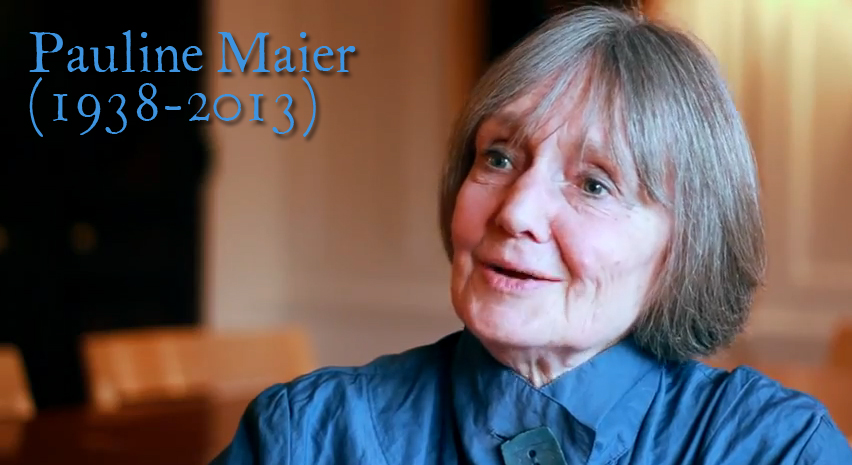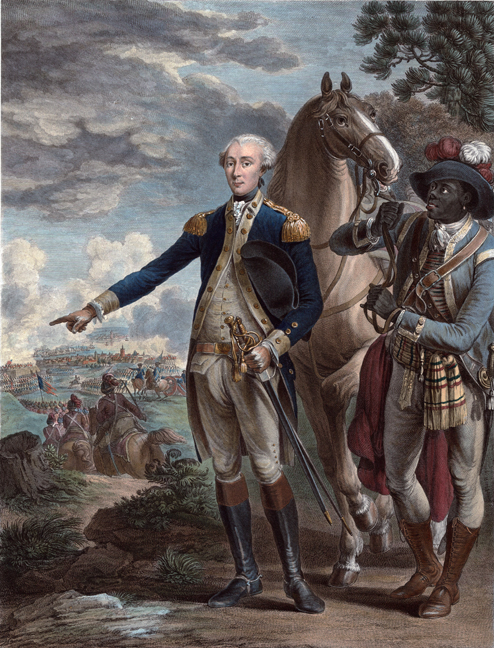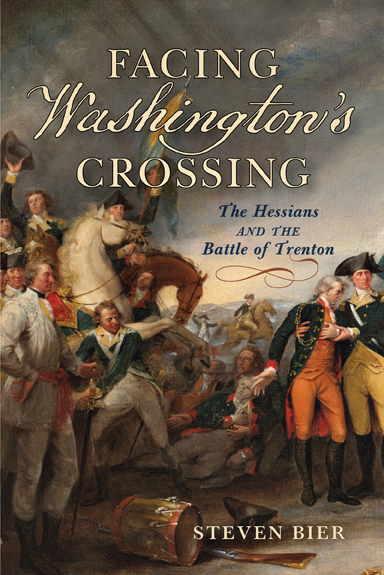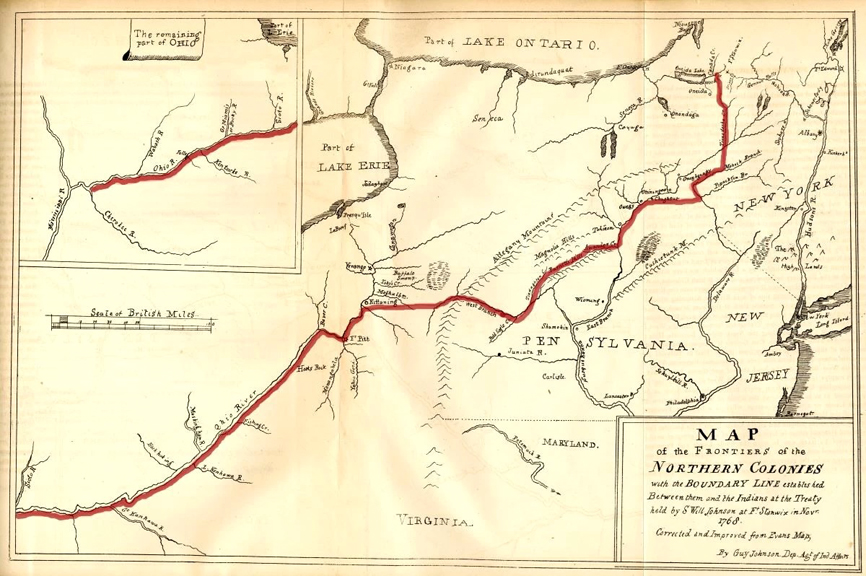 The history community was struck Monday morning with the sad news of Pauline Maier’s passing. She was a preeminent scholar of the American Revolution. Memories and condolences were instantly circulated by thousands on Twitter, followed by numerous blogs that reflected on Maier’s impact and legacy. The discussion network H-NET published an obituary, authored by close friend R. B. Bernstein. Maier was loved by many and will be greatly missed.
The history community was struck Monday morning with the sad news of Pauline Maier’s passing. She was a preeminent scholar of the American Revolution. Memories and condolences were instantly circulated by thousands on Twitter, followed by numerous blogs that reflected on Maier’s impact and legacy. The discussion network H-NET published an obituary, authored by close friend R. B. Bernstein. Maier was loved by many and will be greatly missed.
Journal of the American Revolution contributor Taylor Stoermer suggested the idea of publishing a collection of “Maier Moments,” which we offer below from several of our friends.
***
Pauline Maier belonged to no historical school, despite people’s attempts to catalogue her. She did no more than follow the most basic rules of historical investigation: look carefully, observe people strictly from within their own times, and follow the story wherever it might lead. Asking questions few others posited, she ventured through the span of the Founding Era. What was the character of popular resistance, from the standpoint of British colonials in the 1760s and 70s? (From Resistance to Revolution, 1972.) What did it mean to be a “revolutionary” in those days (The Old Revolutionaries, 1980), and in particular, was Samuel Adams really the flame-thrower we make him out to be today? What was the context for the Congressional Declaration of Independence, in relation to local moves toward independence in 1776? (American Scripture, 1997.) What were people really quarrelling over in the great national debate over the proposed Constitution? (Ratification, 2010. Hint: it was not just about “Federalists” v. “Anti-federalists” – that simple construction drove her crazy.) The results of her investigations were startling, including her most revolutionary revelation, sadly unpublished: the so-called “Bill of Rights,” as a unified body, was historically absent from much of the Nineteenth Century and didn’t fully take form until well into the Twentieth. For all her well-deserved acclaim, we have yet to take much of her work to heart. More of this in a future column.
For now I grieve. Pauline has been a mentor and in recent years my closest historical companion and very dear friend. What’s an allegedly “populist” historian like myself doing with a so-called “neo-Whig”? Meaningless terms. Careful investigation, clear thinking, and cogent writing are all that count, and these we both treasure. Plus good times, the fun of it all. For Pauline, in history as in every endeavor, a life not enjoyed is… well, not enjoyed, and who wants that?
***
Pauline will be remembered for her sharp wit, penetrating insights, keen sense of humor, and scholarly fearlessness, whether in a seminar or at the dinner table. But for all her impressive and influential body of work about the history of the American republic, and her deep but never uncritical love for it, whenever I think of her, I will always think of gardens. Gardening was one of her great loves, and she was always happy to talk about her garden in Rhode Island, with which she seemed to be in an almost constant, but entirely salutary, battle of one sort or another. Once, at a function last year in Indianapolis, we appeared to be engaged in a fierce discussion, and a scholar who didn’t know Pauline assumed it was about constitutionalism or some similar topic. He was surprised when he learned that it was about my apparent inability to keep a mutual friend’s plants alive. Her forthrightness about the things she cared about, from people to plants to the past, set a standard that will not be forgotten–nor will it ever be replaced. I will miss that every day.
***
Pauline’s brilliant scholarship will outlive her, but to see her in action is now a lost privilege. Here is one memory. At a Massachusetts Historical Society seminar, on clothing and consumerism in the early republic, Pauline observed that to make one’s own garments (unmentioned in the paper under discussion) has had a long history, which included her. At that pre-Etsy moment, the discussants were agog that Professor Maier Had Owned a Sewing Machine. It was a well-chosen reminder that to write history requires practical knowledge of everyday life, all the more powerful because delivered by a powerhouse in political and legal history.
***
I’ve studied Pauline Maier since I was an undergraduate fascinated by political mobilization and the American Revolution, and I was fortunate enough to be on a panel with her at the American Historical Association’s annual meeting; but I felt I really got to know her at the annual dinners of the Colonial Society of Massachusetts. Once I had admired her from afar, and then up close I found that she was warm, funny, and generous–a real pleasure to be around. I’ll miss her wisdom and support.
***
I am so sorry to hear of Pauline Maier’s death. I never met Professor Maier, but I knew her through her books and can say without equivocation that she was truly one of our master historians. I had the honor of reviewing American Scripture: Making the Declaration of Independence for the Raleigh News-Observer. What a splendid work. The best I had read on the Declaration since Carl Becker’s when I was an undergrad.
***
Twice my Harvard Extension school students in the History of the American Revolution had the benefit of having Pauline Maier come and talk to them, in the fall of 2004, and the fall of 2007 (I explained that every time the Red Sox were in the World Series she would visit the class). It was a two hour class—each time she would agree to stay only for the first hour, but she and the students would be having such a good time it was hard for her to leave.
She said she especially enjoyed the Extension students because they were hungry for history, reminding her of the students she had taught at U-Mass/Boston many years before.
One of my Suffolk students wrote her after seeing “National Treasure.” Why, he wanted to know, hadn’t she mentioned the treasure map on the back of the Declaration in American Scripture? She sent him a hilarious response, explaining that the guides at the National Archives hurry people by so fast she was not able to look. Otherwise she was sure she would have found it. That student, by the way, is now pursuing a graduate degree in history.
My biggest lesson from Pauline Maier is not about scholarship or history, but rather about the way scholars should engage with one another and the wider world. I cannot remember a time when I needed senior scholars to be on a panel, or comment on papers, or do the other tasks of the profession when she said no. This is why she found herself in my Extension School class, why she always attended the Colonial Society Graduate Student Forum, why a smart-aleck undergraduate received a meaningful response to a tongue-in-cheek question, and why so many of us now mourn her passing.
***
My encounter with the late Pauline Maier was through her final book, Ratification: The People Debate the Constitution, 1787-1788. This book was an example of what a historical monograph should be. There was no disputing her academic status or intellect because as I read through the book I kept coming across a wide range of sources such as records from the conventions and state legislatures, private letters from delegates, and newspaper accounts. This signified that she had conducted extensive research into the subject and had built her case on solid ground. The most impressive thing though was how the book read. Maier’s writing was not stuffy and phrased like so many academic works, but instead it flowed like a good narrative should. I ended up turning page after page as a result. Pauline Maier had shown me that a historian can be a good writer by giving me a working guide as to how it can be done. I imagine that if I could have met her I would have asked her more about writing than history.
***
From Resistance to Revolution long held prominent real estate on my book shelf, but I was a complete stranger to Pauline until I introduced myself via email in 2011. She always took the time to respond to my messages, offering sound counsel and encouragement for my various projects. Reading through our correspondence, I found one of my favorite exchanges about American Revolution newspapers. Pauline wrote: “I couldn’t agree with you more on 18th-century newspapers… When I began doing work on this period, Houghton Library would bring me big books with complete issues of the BOSTON GAZETTE to read. I remember one library staff member noting that I read them more slowly than they were printed, and they were, of course, weeklies. In any case, as I read them, little bits of the eighteenth century crumbled onto my lap.” Pauline’s kind words and wonderful spirit will be missed, and her remarkable works of early American history will be critically important to many generations of readers and researchers to come. She had this to say at the conclusion of her first email response to me: “It’s very gratifying to be reassured that there are people out there who like my books. I sure loved working on them!”








6 Comments
Last year, I was fortunate enough to take a six-week seminar on American constitutionalism that Pauline co-taught at the New York Historical Society. One day I pointed out a factual error in Ratification and at the end of the seminar, she signed my copy, “To Michael, who will appreciate the details,” and laughed. In addition to the comments made about her skill as a historian and writer, we can all take a lesson from her regarding historians’ relationship to the public. She regularly spoke to audiences of general readers and secondary teachers, gave interviews, and generally tried to bring the excitement of early American history to an audience beyond her fellow academics.
I think of myself as Pauline Maier’s one and only Ph.D. student. In Spring 1983, Pauline was asked to teach the undergrad course at Yale on the American Revolution usually taught by my adviser, Ed Morgan, who was on leave that semester. I was her only TA. Hard as it is to believe, women professors at Yale were still pretty rare at that time. From that time on, she became my mentor, friend, and intellectual companion. I still can’t believe the stroke of luck that allowed our lives to converge. I am so sad at her untimely death.
–Rosemarie Zagarri
Wow, Rosemarie, that is an amazing stroke of luck. What a great story. Thanks for sharing.
As illustrious as Maier was, let’s keep our scholarly hats on and remember that she had—how can I say this diplomatically?—an odd writing style. A too typical sentence would be punctuated with multiple quotes of one or two words combined with multiple quoted phrases. For example, from Ratification,, she wrote of Aaron Burr, who:
said “political strife” was “still high” in Albany, but that was “the only part of the state where the spirit of the party…is thoroughly alive.”
Or:
Randolph also believed that “this great subject” would be “placed in new lights and attitudes by the criticism of the world,” and that nobody could predict how the Constitution would work over time “until at least he has heard the observations of the people at large.”
While I appreciate the “contribution and achievement,” reading a 472-page book riddled with “disjointed quotes” could be a challenge of “balancing her great information” with the “irritation” of constantly being “visually” interrupted.